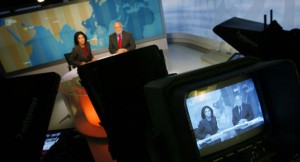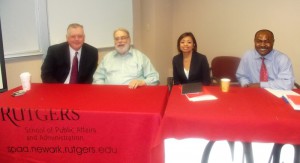At the peak of the Vietnam War in the second half of last century, the inimitable Walter Cronkite declared in a February 27, 1968 broadcast that “We Are Mired in Stalemate”. Cronkite advised negotiation “…not as victors, but as an honorable people who lived up to their pledge to defend democracy, and did the best they could.” With this historic broadcast the excellent journalist, Cronkite played the role of the umpire.
Although the political disagreements that dog progress in Washington are not a physical war, it is clear that the country is mired in stalemate. Democrats and Republicans have perpetrated the gridlock, the White House and Congress are at cross roads, and the judiciary is not even immune from the jaded view of the public in terms of crafting effective public policy. With no imminent truce between the two arms of government—the executive and legislature, can the fourth estate play its role of umpire more effectively? As midwives of democracy, can journalists safeguard American democracy being threatened by intolerance and extreme ideology? Or can the forthcoming elections settle the impasse in Washington?
As most Democrats and Republicans notably the two presidential candidates have acknowledged, the electorate is presented with stark choices in the 2012 elections. It is a choice about the role of government, taxes, regulation, healthcare, restoration of the middle class, and more. The array of choices is a display of democracy’s beauty and uniqueness of American democracy.
President Barack Obama and Governor Mitt Romney have been campaigning across the country to woo voters to their side. President Barack Obama promised voters will choose between “two fundamentally different visions of how America became great and how it’s going to stay great.” Mitt Romney on the other hand said that the campaigns present “competing visions about the future of America”. And the choice of Congressman Paul Ryan as the Vice Presidential candidate on the Republican side has further sharpened the debate over key issues in the election notably the future of capitalism, entitlement programs and so on. Political surrogates of both parties and political pundits have umpped the ante. Political reporters and editors are having a field day. But, this quadrennial festival must produce a truce this time. Since we all pledge to defend democracy it is expected that election outcomes should be respected.
Governor Mitt Romney and President Barack Obama
In this connection, I challenge reporters and editors to commit politicians of both parties on record to answer a simple question: if either of the party wins in November, does that end the stalemate in Washington? In other words, will the election be enough evidence for losers to support the winners’ proposals and reduce the unbridled partisanship? When a reporter interviews a key politician the reporter should put that politician on notice that his/her response will be used in future if they detracted from the contract to tone down partisan rhetoric. This should be repeated over and over again among congressmen and other political leaders. Elections should be consequential. It should be made to offer a resolution to major disagreements on policy.
Unfortunately, the 2008 presidential election did not resolve any competing viewpoints instead it accelerated debates on virtually every important issue to future of this country. This leads one to conclude that election cycles in the US may not produce intended results if the populace will spurn outcomes.
In How the West Was Lost, the New York Times bestselling author and international economist, Dambisa Moyo alluded to lopsided energy and time spent on American politics to the expense of developing and sustaining credible policies that can prevent the decline of the West’s economic supremacy. She argued that the West’s flawed financial decisions have resulted in an economic and geopolitical seesaw that is now poised to tip in favor of the emerging world, especially China.
Similarly, William Hudson in his provocative and engaging book, American Democracy in Peril: Eight Challenges to America’s Future, reflected on how electoral politics and privileged position of business in or society undermine democracy. Hudson wrote:
“Elections in America have become increasingly trivialized and leaving the electorate with very little options. The choice between candidates comes down to petty rhetoric that ignores important issues that affect the people. The result is that elections are largely decided on the basis of sound bites, negative campaign commercials, and sensationalized exposure of personal character flaws.” (p. 215)
Clearly Hudson’s analysis shows that partisan sniping is likely to continue and citizens will experience an unending cycle of elections structured in similar techniques and bickering. The consequence is the inability of politicians to deliver on their promises before the next cycle of elections. As this election cycle has shown, we are inundated with promises and many that cannot be fulfilled before the next cycle of elections.
It is my considered view that the political press can help to reverse a trend where politicians take the electorate for granted. Professional politicians who merely look forward to election cycles should not be encouraged to continue in that business. The revolving elections and the requirement to pay attention to its outcome make it more difficult for incumbents to concentrate and do their work. The media through its analysis of contemporary political analysis should empower citizens to revitalize American democracy to overcome the perils of complacency and conventional wisdom.
In the final analysis, journalists owe the country the duty to end the stalemate in Washington regardless of the partisanship that exists within the media itself. Journalists should drive the narrative towards a consensus that this particular election should have consequences which all citizens including congressional leaders must respect.
The bottom line is that Republicans want to replace President Obama and implement the party’s policies. On the other hand, Democrats want President Obama to retain the White House and continue with the party’s policies.
Whatever is the verdict in November; all Americans should unite to push and support the policies that receive the greatest support from the citizens. We expect a ceasefire effective November7, 2012 and journalists can help to make this to happen. After all, journalists are the midwives of democracy and they can help to deliver a sense of decorum, order, and civility within the polity.
Walter Cronkite’s injunction is instructive. Journalists should get involved in negotiating a truce among politicians and help to seek a common ground, reduce the stalemate, and defend democracy.
Dr. Uchenna Ekwo is a public policy analyst and President of Center for Media & Peace Initiatives







